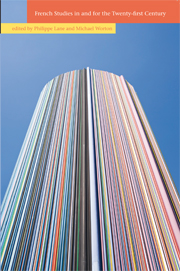Book contents
- Frontmatter
- Contents
- Notes on Contributors
- Foreword by Baroness Jean Coussins
- Foreword by His Excellency Bernard Emié
- Part I Contextualisations
- Part II Research and Public Engagement Strategies
- Part III The Place of Women and Gender in French Studies
- Part IV The Place of Literature
- Part V The Place of Linguistics in French Studies Today
- Part VI Theatre, Cinema and Popular Culture
- Part VII Area Studies, Postcolonial Studies and War and Culture Studies
- Part VIII Adventures in Language Teaching
- 19 French Studies at the Open University: Pointers to the Future
- 20 Opportunities and Challenges of Technologically Enhanced Programmes: Online and Blended Learning at King's College London
- 21 French Studies and Employability at Home and Abroad: General Reflections on a Case Study
- 22 Sartre in Middlesex, De Beauvoir in Oxford: The Contribution of the ASMCF to the Study of France
- 23 Culturetheque: A New Tool for French Culture
- Appendices. Addresses to the Future of French Studies Conference
- Index
20 - Opportunities and Challenges of Technologically Enhanced Programmes: Online and Blended Learning at King's College London
from Part VIII - Adventures in Language Teaching
- Frontmatter
- Contents
- Notes on Contributors
- Foreword by Baroness Jean Coussins
- Foreword by His Excellency Bernard Emié
- Part I Contextualisations
- Part II Research and Public Engagement Strategies
- Part III The Place of Women and Gender in French Studies
- Part IV The Place of Literature
- Part V The Place of Linguistics in French Studies Today
- Part VI Theatre, Cinema and Popular Culture
- Part VII Area Studies, Postcolonial Studies and War and Culture Studies
- Part VIII Adventures in Language Teaching
- 19 French Studies at the Open University: Pointers to the Future
- 20 Opportunities and Challenges of Technologically Enhanced Programmes: Online and Blended Learning at King's College London
- 21 French Studies and Employability at Home and Abroad: General Reflections on a Case Study
- 22 Sartre in Middlesex, De Beauvoir in Oxford: The Contribution of the ASMCF to the Study of France
- 23 Culturetheque: A New Tool for French Culture
- Appendices. Addresses to the Future of French Studies Conference
- Index
Summary
Background
Blended learning, a mix of face-to-face and virtual interactions, and online courses have been developed at the Modern Language Centre (MLC) at King's since 2004. They are a key component of the department's strategy for fostering autonomous learning both within credit-bearing language courses, and for students enrolled on non degree-language programmes, while adhering to Quality Assurance Agency (QAA) criteria and promoting academic excellence. Incorporating an e-learning dimension into existing face-to-face programmes, and designing specific online material and courses has been a deliberate policy choice, both in support of the college's own strategic plan, and in the desire to enhance the learning experience of students. Although the level of involvement in blended learning and online programmes varies across the college, some departments have already established a global reputation in delivering innovative online programmes, examples being King's Dental Institute and the Department of War Studies.
The projects undertaken by the MLC were entirely college funded through a succession of bids, and benefit from the support of a dedicated e-learning team within the MLC, including coordinators and a part-time technician. In addition, and perhaps to an unusual extent, a majority of MLC staff have an interest in technologically enhanced teaching methodology, and have been particularly responsive in taking up training opportunities in this area.
- Type
- Chapter
- Information
- French Studies in and for the 21st Century , pp. 247 - 261Publisher: Liverpool University PressPrint publication year: 2011
- 1
- Cited by



